Another one of those quick announcement posts, but this one is really important and an interesting step in the right direction for the Open Source WordPress community.
A new project, which was first mentioned at WCUS 2018, entitled the WordPress Governance Project will be having its first meeting next week, on 15 January 2019, at 4pm UTC (which is also 4pm GMT and 5pm CET for those following along in Europe who don’t have UTC conversion running in their brain… 🙂 ).
Please note amended date, above. Also, this is now happening in a dedicated WP Governance Project Slack channel, and there is an official website, as follows:
- Official Slack Channel (you need a WordPress.org Slack address to signup for this)
- NEW official website here.
The information on this is in the official announcement here, but for those of you who enjoy a TL:DR from an interested observer, I’m bullet pointing the main take-aways that I… well… took away from that (well written) announcement (all because I love writing lists in Gutenberg):
- The project is to explore the Governance of WordPress and its various community components (core); and
- To explore the role of WordPress in the Governance of the Open Web (lofty)
- To propose a Governance model for WordPress at or before WordCamp Europe 2019 or the (not 100% confirmed) 2019 Community Summit. To incorporate:
- A set of principles based on and defining the core philosophy (“
To democratize publishing through free, open source software. “) - A leadership and governance model for the open source project and its communities
- A model for electing or appointing representatives to speak on behalf of WordPress and its users.
- A set of principles based on and defining the core philosophy (“
- Once the WordPress Governance Project puts forward its proposal, it is up to the current WordPress leadership, and the community generally to decide whether to adopt the new model.
That last point means that it may not happen, or it may not be adopted ultimately, but even so, the exercise is worthwhile, and the conversation does, in my opinion, need to happen. I will be interested to add my voice to this worthwhile debate, regardless of outcome.
Philosophically, this is democratizing publishing.
